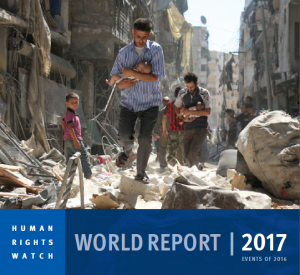
 American rights group Human Rights Watch has released the 27th edition of its annual World Report, which includes detailed chapters about the state of human rights in Armenia, Azerbaijan, Georgia, and Russia.
American rights group Human Rights Watch has released the 27th edition of its annual World Report, which includes detailed chapters about the state of human rights in Armenia, Azerbaijan, Georgia, and Russia.
The authors of the report note a global trend of rising populism, reflected by unrestrained majoritarianism and assaults on government checks and balances, which constitutes a global threat to human rights values.

Armenia
‘Armenia’s human rights record remained uneven in 2016. Authorities used excessive and disproportionate force against peaceful protesters, assaulted journalists, and pressed unjustified criminal charges against protest leaders and participants. Ill-treatment in custody remained a persistent problem, and investigations have been ineffective. Other concerns include domestic violence, often perpetrated with impunity, violence, and discrimination based on sexual orientation and gender identity, and unnecessary restrictions on access to pain medications for people with life-limiting illnesses’, the group writes.
The report brings up examples of the excessive use of force against peaceful protesters and assaults on journalists during the Daredevils of Sasun crisis in July. Many of the protesters were subjected to arbitrary detentions, beatings, and unjustified criminal charges.
In terms of women’s rights, the authors note that ‘Armenia still has no law criminalising domestic violence (…). The Coalition to Stop Violence Against Women published a report documenting 30 cases of women killed by intimate partners and family members between 2010 and 2015. The report notes that domestic violence is grossly underreported and largely perpetrated with impunity.’
When it comes to LGBTIQ rights, the authors write that ‘lesbian, gay, bisexual, transgender, and intersex (LBGTI) people face discrimination, harassment, and violence. The government has not addressed hate speech or discrimination against LGBTI people. Gender identity and sexual orientation are not included as protected grounds in anti-discrimination or hate speech laws, limiting legal recourse for many crimes against LGBTI people.’
Azerbaijan
‘The government continued its thorough crackdown on dissenting voices in 2016, leaving a wide gap in Azerbaijan’s once vibrant independent civil society. Authorities released 17 human rights defenders, journalists, and political activists imprisoned on politically motivated charges. But at least 25 government critics remained wrongfully imprisoned, including political activists and bloggers arrested in 2016. Restrictive laws continue to prevent nongovernmental organizations (NGOs) from operating independently. Reports of torture and other ill-treatment persisted throughout the year. The September 2016 constitutional referendum abolished minimum age requirements for presidential and parliamentary candidates, extended from five to seven years the presidential term of office, and expanded the power of the presidency’, the authors of the report write.
While president Ilham Aliyev pardoned 13 journalists, human rights defenders, activists, and bloggers in March 2016, new arrests followed in August, including of Fuad Ahmadli, a well-known social media activist and senior Azerbaijan Popular Front Party member, and Faig Amirov, financial director for the leading opposition newspaper Azadlig. Independent outlets faced harassment and closure, and critical journalists faced threats and intimidation aimed at silencing them.
‘In May, police arrested youth activists Giyas Ibrahimov and Bayram Mammadov for spraying graffiti on a monument to former President Heydar Aliyev and demanded that they apologize on camera. When they refused, policemen beat and threatened to rape them with truncheons to force them to confess to drug possession. Authorities failed to conduct an effective investigation into the ill-treatment allegations. In October, Ibrahimov was sentenced to 10 years’ imprisonment; Mammadov’s trial was ongoing at time of writing’, the report reads.
Georgia
‘Georgia’s ruling party swept to an overwhelming victory in October 2016 parliamentary elections. The state security service’s unfettered access to telecom operators’ networks compromised the right to privacy. Lack of accountability persisted for abuses committed by law enforcement. Other areas of concern included media freedoms and the rights of lesbian, gay, bisexual, and transgender (LGBT) people’, the authors of the report write.
The report notes that Georgia does not have an independent effective mechanism for investigating crimes committed by law enforcement officials. ‘In July, the Georgian Young Lawyers’ Association (GYLA), a leading human rights group, published a report analyzing 22 cases they litigated in the past two years concerning alleged torture and ill-treatment by law enforcement officials. GYLA concluded that in most cases the investigations were ineffective. In several cases, officials retaliated against the victims who had filed complaints by pressing administrative and criminal proceedings against them’, the report reads.
LGBTIQ rights remained a heavily politicised issue in 2016. ‘In August, President Giorgi Margvelashvili blocked a referendum bid on defining marriage as a union of a man and a woman, saying that the issue is already covered in the civil code. Prime Minister Giorgi Kvirikashvili vowed to pursue a constitutional definition of marriage after the October elections, arguing that this would help counter alleged Western efforts to spread same-sex marriage “propaganda” in Georgia. Local rights groups feared this effort would further marginalize the LGBT community and intensify anti-LGBT prejudice’, the report reads.
North Caucasus
In the chapter dedicated to Russia, the authors noted that harassment of Salafi Muslim communities remained a problem. The state of human rights in Chechnya have also deteriorated, including the arrest of Caucasian Knot’s journalist, Zhalavdi Geriyev.
‘Armed confrontations between Islamist insurgents and law enforcement agencies continued in the North Caucasus, particularly in Dagestan. Russia media continued to report on North Caucasus residents leaving Russia and joining the Islamic State (also known as ISIS) as well as on cases of detentions of North Caucasus residents allegedly affiliated with ISIS. Salafi Muslim communities in Dagestan were subject to intense scrutiny and harassment as law enforcement largely equated them with insurgents or their collaborators. Authorities placed Salafis on watch lists, repeatedly detained and questioned many of them without specific grounds; raided Salafi mosques; and carried out mass detentions of believers. They closed several Salafi mosques, including in Makhachkala, Dagestan’s capital. Chechnya’s strongman, Ramzan Kadyrov, asserted that Salafis have no place in Chechnya, instructing police to punish those who stray from Sufi Islam, traditional for the region. Police raids against Salafis were widespread. Authorities also pursued collective punishment, including punitive house burnings, against relatives of alleged insurgents’, the report reads.
According to the report, ‘Ahead of September elections for the head (governor) of Chechnya, local authorities targeted critics and those deemed disloyal to Kadyrov, including through abductions and enforced disappearances, ill-treatment, death threats, and threats of violence against relatives. Chechnya’s authorities also attacked critical journalists and human rights defenders. In March, a group of masked men believed to be Chechen officials’ proxies, attacked a minibus carrying Russian and foreign journalists traveling to Chechnya, beat the journalists, and burned the bus. The following week, thugs apparently acting as Chechen authorities’ proxies physically attacked the leader of Joint Mobile Group for Human Rights Defenders in Chechnya (JMG). JMG withdrew its team from Chechnya for security reasons. In May, Chechen police arbitrarily detained and threatened a Russian journalist researching a punitive house-burning. In September, following an unfair trial, a Chechnya court sentenced 23-year-old local journalist Zhalaudi Geriev to three years’ imprisonment on fabricated drug possession charges, apparently in retaliation for his work with Caucasian Knot, known for critical coverage of Chechnya.’









